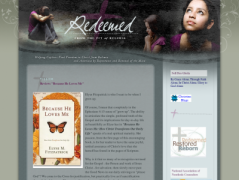 Catherine of Siena was bulimic. So was Theresa of Avila.
Catherine of Siena was bulimic. So was Theresa of Avila.Did you know that? I’ll bet you didn’t know that fellow mystic, Catherine of Alexandria, is the patron “saint” of anorexics and bulimics.
One of the most bizarre chapters in Christian history is that of the Medieval ascetics. Many of these devotees to Christ and the so-called “cult of the Virgin” daily flagellated themselves, starved themselves, wore chains and hair shirts, mutilated their own bodies (particularly their sexual organs), and even purged food as an act of piety and self-denial. Some even ingested cat vomit as an act of 'penance' (Norman Cohn, review of Holy Anorexia, 1986).
Amy Indyke writes about Catherine of Siena: “This 14th century woman subjected her body to ruthless abuse and neglect throughout her life; these severe practices informed her theological constructs. Catherine does not discuss the extent of her asceticism in her writings, but the eyewitness accounts of her practices are innumerable. Her bulimia was so infamously extreme that she was reported to have shoved “twigs down her throat to bring up the food she could not bear to have rest in her stomach. Other accounts report spontaneous vomiting.” The idea of swallowing twigs and “spontaneous vomiting” denotes extreme pain caused by bloody lacerations, scratches, and the blood vessels that burst from forced vomiting. Rudolph Bell, author of Holy Anorexia, asserts that "not only did Catherine die from starvation but also from her perverse bodily mortification. She was also a flagellant who whipped herself “with chains for an hour and a half three times daily. At one time she wore a hair-shirt, but later replaced it with a chain bound to tightly about her that it embedded itself in her flesh. She reduced her sleep to approximately one half hour every two days, and used only a board for her bed.” Whipping and tightly-bound chains must have left her body bruised and torn. She believes suffering is necessary also because it imitates Christ’s paradigm, embodied by his crucifixion, and facilitates the Soul’s reintegration with God.” (Emphasis mine).

<== A heavily "re-touched" picture of Catherine of Siena
This kind of twisted thinking is difficult to fathom, even for the unregenerate mind. Self-destructive behavior is sinful, and the idea that it was held as a sign of holiness is a perversion, obviously, of biblical truth. Elevating starving and purging to the level of virtue is a twisting, a bastardization of the spiritual discipline of fasting and self-control (which is one of the fruits of the Spirit).
“In the medieval period, the control, renunciation, and torture of the body were understood not so much as a rejection of the physical, but as a way of achieving the divine…Theresa of Avila began frequently to use twigs of olives to induce vomiting and completely empty her stomach. In this way she was able to truly take into herself the Host, which became her unique source of sustenance. From an investigation of the conduct of 170 Italian medieval saints by Rudolph Bell (1985), fully one half of them exhibited symptoms of anorexia.” (Mario Reda,“Anorexia and the Holiness of Saint Catherine of Siena”).
As a former Catholic, I can attest that a much more subtle form of this "piety by suffering/starvation" still exists - especially among women who grew up before the Second Vatican Council. These medieval "saints" were held up to women of my mother's generation as heroines and role-models (I recognized the painting of St. Catherine above immediately -- from my mother's "Lives of the Saints for Children"). My mother's particular hang-ups about food may or may not have had anything to do with her fanatical catholicism, but the morbid fascination with "mortifying the flesh" rampant in that religion is a sort of gnosticism (the idea that matter is inherently evil, and the physical flesh must be subjugated). Nowadays, it is far less pronounced - I am quite sure none of my Catholic neighbors sleeps in a hair shirt, or that the local priest would condone (or even knows about) Catherine and Theresa's bulimia.
Without getting into a lengthy discussion of medieval mysticism and why altered states of consciousness are demonic, (Ray Yungen does an excellent job of addressing this subject in “A Time of Departing”, as does Dave Hunt in “The Seduction of Christianity”), suffice to say that contemplative spirituality, which gripped the Roman church and thousands of pious young women during the Middle Ages, is a counterfeit trap of Satan. The lure of mysticism arises from it’s emphasis on personal experience, and is essentially a flesh-pleasing form of spirituality. Subtly, all biblical principals are misconstrued or ignored – the soul is seduced with the promise of “union with the divine”. Extreme fasting has traditionally been a part of this practice, which elevates altered states of consciousness to a holy rite.
1. Humans were made in the image of God.
2. Satan wants to kill, steal and destroy (John 10:10) children of God.
3. One way he attempts this “revenge” against God is by harming you physically (even killing you, if possible).
When writing my book, I discussed at length the fact that Satan cannot make the believer do anything, but he can tempt you to harm yourself. This is especially effective if he has convinced the believer that the self-harm is a good thing, or has spiritual value (on some level, many women today believe that self-starvation is a noble, if not spiritual practice). One of the main ways the devil has operated from the beginning is by twisting God’s words and thus brainwashing His children.
 <==A "holy woman", or one desperately in need of help?
<==A "holy woman", or one desperately in need of help?I am convinced this is what happened among the medieval mystics, secluded in their austere convents. They were not reading God’s Word, which was forbidden at the time, but instead were relying heavily on their subjective, ecstatic experience. Furthermore, the notion that they, as sinners, could participate by physical suffering in Christ’s redemption of humanity belies an almost incredible hubris on their part. From the scant amount of research I’ve done on these Catholic ascetics/contemplatives, I am convinced that many of them were demon-possessed (or at least suffering demonic oppression). Out of body experiences are one of the characteristics of occultism, and combined with the unscriptural practices of the monastic life, demonization was the natural result.
“….a certain level of pain and suffering through careful dieting may be required. Women are not forced to do this by male religious authorities. This is not masochism either. On the contrary, young anorexics and bulemics believe that their pain brings them closer to God, for self-inflicted suffering imitates Christ’s own pain and suffering on the Cross. Saint Catherine is therefore the patron saint of anorexics. Modern women have a tendency to suffer guilt and remorse when they diet, instead of regarding it as a healthy spiritual process. Such suffering is unnecessary if modern women can learn that through the pain of the Eucharist and fasting that they can attain that higher mystical state. Women must learn to renounce food while the men must renounce power.” (“Voices and Saints”, emphasis mine).
How food and spirituality became intertwined is an interesting historical subject, but the spirituality ascribed to self-starvation did not begin with 20th century Western culture. I like to think, though, that no woman today purges in the Name of Christ. It is inconceivable to me that these “holy” women are canonized as saints; their purging and cutting given sacred value.
As a Christian counselor, it is particularly bizarre to me seeing how the concept of faith and holiness has historically been perverted to sanctify anorexia and bulimia. “Woe to those who call evil good and good evil, who put darkness for light and light for darkness, who put bitter for sweet and sweet for bitter.” (Isaiah 5:20). Ladies, self-starvation, mutilation (including cutting), induced vomiting, and excessive restricting is not God’s will for you, and it never was. It is a false idol, an impure practice and is destructive to your body – the temple of the Holy Spirit. There is NO virtue in this practice, and it does not make you one iota holier – only progressively enslaved to sin. You cannot live the abundant life Christ promised – which includes obedience to Him and service to others – if you starving and purging yourself to death.
Catherine of Siena starved herself to death, by the way – in “atonement for the Church’s sins”. A rather ignoble end to a tortured life.



























